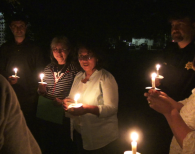Swastikas appeared on a Jewish fraternity several weeks ago, reminding the University of California, Davis community of the dangers of ongoing anti-Semitism and hate. NIOT is working with a group of Davis residents who want to change the atmosphere in town.
California
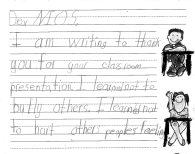
Not In Our School is proud of the multi-year work at Soledad High School in Soledad, CA. In this profile, two NIOS leaders reflect on the anti-bullying work they continue to push in their school district—Aidee Aldaco, a staff member at Soledad High, and Robert, a student who helped found Soledad NIOS with his older brother Alex, a current NIOS intern.
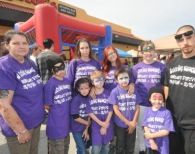
Girl Scouts Promote Anti-bullying Message
A group of 5th-grade girls are ready to change the world.
Members of Junior Girl Scout Troop 20384 are sending the message ‘Be a Buddy, Not a Bully,’ by working on a Bronze Award project as part of their effort to stop bullying.
The troop shared their anti-bullying message using a PowerPoint presentation, a coloring page, and word searches at a National Day of Service event held at a local high school, according to The Alternative Press. These resources will be used in a local elementary school’s anti-bullying curriculum.
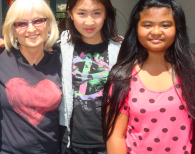
Livia Thomas and I met in 2012 when she sent on a note of desperation about a bullying incident at her elementary school. Principal Judy Nye and Livia were terribly concerned that their well-managed and peaceful Grimmer Elementary School had ongoing bullying that had not been reported, while hosts of students were negatively impacted.
Grimmer’s situation is not uncommon. Students often are afraid or ashamed to tell adults about being bullied. Dr. Jonathan Cohen, Director of the National School Climate Center, says that in numerous cases, bullying is not reported while staff are oblivious that a calm exterior masks terrible incidents of bullying, teasing, and intolerance.
Bullying is everywhere, but taking concrete steps to prevent and respond make a big difference. That is just what Livia and Principal Judy did. That is why we selected Grimmer as the site of our first elementary film production and we were thrilled with the outcome.
—Becki Cohn-Vargas, Not In Our School Director
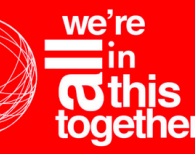
Several Palo Alto, CA schools host Not In Our School weeks this month, devoting time to recognizing and combating discrimination and stereotypes.
Not In Our School (NIOS) has been present at Gunn High School for 12 years. While Gunn promotes acceptance and awareness to its students year-round, the NIOS week allows students to actively think about these topics and participate in assemblies and activities with classmates. Gunn’s theme is “We’re all in this together,” according to Palo Alto Online.
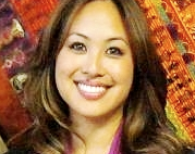
By Lauren Getuiza
Educators, consider this scenario:
Jandell is a 15-year-old student who you’ve known for years. He seems like a typical adolescent in every way. He has a group of friends, gets decent grades, and is involved in after-school activities. He appears to get along well with teachers, parents and other students.
Over the summer, he was involved in a serious auto accident with his older brother. They both recovered from their injuries; however, Jandell doesn’t seem like himself this year. He is not as engaged in class, though he still manages to keep up his grades. He also seems a bit more emotional than before and he no longer hangs out with his friends. Instead, he only wants to be around his brother.
As the school year progresses, Jandell blows off your initial outreach. He stops participating in his after-school activities and appears to be jumpy—overreacting to almost any loud noise. He often looks tired and run down.
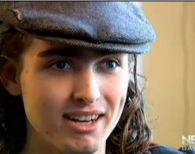
In November, a high school student wearing a skirt was set on fire on an Oakland, CA city bus. Sasha Fleischman identifies as agender and prefers to go by the pronoun “they.” In the weeks after the hate attack, many conversations ensued about hate and acceptance alongside dialogue about the way we talk about gender. Here, Mazique Bianco explores gender terms directly, pointing to the empathy and compassion in each of us.
By Mazique Bianco
At a sun-drenched table at a cafe in Oakland, I listen to two people next to me discussing a hurt they have experienced. I’ve joined their table as a stranger in the packed cafe. I feel an affinity with them. One of the two friends gets up and the person next to me meets my eye. I ask them if they are going through something difficult, and their face breaks open into more softness.
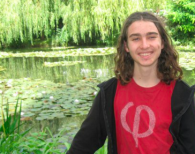
Overwhelming support has poured in for Luke “Sasha” Fleischman, an agender high school student who was set on fire Monday night on an Oakland, CA bus.
Police arrested a 16-year-old Oakland student for the immolation, and announced on Thursday that he will be charged as an adult for a hate crime.
Sasha was wearing a skirt at the time of the attack, which friends and family fear may have been the reason Sasha was targeted. The teenage attacker later admitted that he did it because he was “homophobic,” according to lead police investigator Anwawn Jones. Sasha is currently a high school senior in Berkeley, CA.
In less than a day after the attack, supporters came forward to help Sasha, who sustained third-degree burns and will require massive skin grafting.
Update Nov. 14: Show Your Support in Oakland
Not In Our Town and Not In Our School will be joining the Rainbow Road march today at 5:30 p.m. We invite all to come forward and support a safe and inclusive community for all.
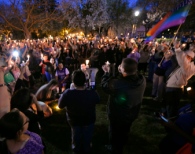
Alexandra Lee-Jobe is a longtime social activist and educator in Davis, CA. An active member of the Unitarian Universalist Church of Davis, Alex has led the organization's Anti-Racism Task Team and worked tirelessly to initiate and improve diversity and inclusion in her community. Recently Alex has become a founding member of the Davis Phoenix Coalition, a member of the Not In Our Town Network. This group is working on creating an inclusive community center servicing the diverse Davis community.
Tell us about your community.
Davis is a small city with a population of 66,000 residents and 33,000 college students. The University of California, Davis is the largest employer of 28,000. It's a bike-friendly city with a well-respected school system and a "liberal" community. It is also known as the second most educated city in the U.S. I went to college here, in 1972-73, receiving a B.S. in Applied Behavioral Science.
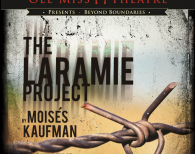
Bowling Green Community Stands Together Against Racist Tweets, Again
